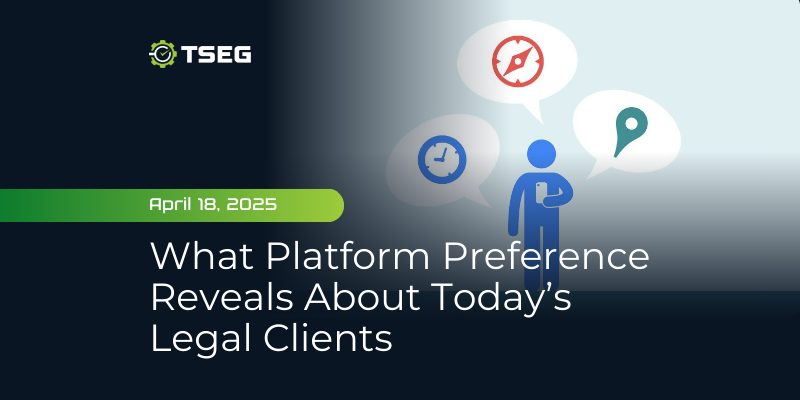What Platform Preference Reveals About Today’s Legal Clients
Posted on Friday, April 18th, 2025 at 9:05 pm
Search Habits Aren’t What They Used to Be
For years, Google was the default starting point when someone had a question. That’s no longer a given. Today, people bounce between platforms depending on the kind of answer they’re after—and how they prefer to receive it.
Younger users are seeking answers to legal questions on TikTok and YouTube. Some are typing full scenarios into Reddit to hear from others who’ve been in the same situation. Others are still going to Google, but they’re skimming through paid listings and “made for SEO” content in search of something that feels more personal, more human, more real.
Beyond search preferences, this highlights a change in expectations. People want different things from different platforms. They trust TikTok to show them how something works. They trust Reddit to uncover what others really think. And they trust YouTube to walk them through a thorough process, step by step.
That’s where law firms need to pay close attention. When someone’s looking for help with a personal injury claim or wondering if they can sue after a denied insurance payout, their first stop may not be your homepage—or even your Google ad. It might be a short video clip, an online forum discussion, or a full length testimonial video.
If your content only lives on your website or in Google’s search results, you’re limiting how—and where—people can discover your firm and take that first step towards hiring you.
Understanding Active and Passive Search Behaviors
Each platform serves a different function in the way people gather information. TikTok is where curiosity starts. YouTube is where people go to understand. Reddit is where they seek validation. Google still matters—but often, it’s the final step, not the first.
Part of what separates these platforms is how people use them: actively or passively. On Google, users are typically in active search mode—they know what they want and they’re typing it in directly. On TikTok or Instagram, the search often starts passively. A video catches someone’s attention, sparks a question, and sends them down a path they didn’t plan. That’s still a lead—it just started differently.

Think about a potential client who’s frustrated with their landlord. They’re not jumping straight to Google to search for a lawyer. Instead, they might open TikTok and type a very broad term like “bad landlord story” to see if others have dealt with the same issue, and more importantly to verify that they’re not alone. They may also search Reddit to find old posts full of comments about how similar landlord situations played out legally. Only after that do they feel ready to seek legal help, and even then, they’re looking for someone who is credible—not just someone who ranks well on Google.
This layered behavior means your law firm’s content can’t afford to live in isolation. Someone might meet your brand in a 30-second video. Someone else might see a positive comment from a past client on a Reddit thread. Another might land on your FAQ blog only after those first touchpoints.
If you’re only visible on one platform, you’re invisible on others where people are already asking the questions your firm can answer.
Not All Search Engines Are Trusted Equally
The days of blind, unquestionable trust in Google results are fading. Younger users, in particular, are more skeptical of sponsored content and polished websites with no real substance. They’ve learned to spot when something is written for clicks instead of clarity. That’s why platforms like Reddit and TikTok are climbing in trust—because the content feels more organic and more personal.
When someone searches legal questions on Reddit, they’re often not looking for a law firm yet. They want to see discussions that have organically taken place online for similar legal issues they’re currently facing. They trust unbiased honesty, not marketing content. The same goes for TikTok. A well-edited, authentic video explaining ‘what to do when getting pulled over’ might hold more weight than a generic blog post—especially if the person on camera is a real attorney speaking plainly. See this great example from @attorneytom:
@attorneytom How to act when you’re pulled over by the police. #cop #cops #police #car #cars #pulledover #jail #law #lawyer #speed #copsoftiktok #help #tips #facts ♬ original sound – Attorney Tom
This doesn’t mean people are replacing lawyers with influencers. It means they’re using trust signals to decide which lawyer they want to call.
Law firms need to think beyond ranking on Google. That matters, but it’s no longer the full picture. Credibility needs to show up in media that users like to consume in the outlets with personalities they trust.
Building A Strategy Around Search Behaviors
For law firms still anchoring their SEO strategy around Google alone, it’s time to rethink the entire playbook.
Your future clients are browsing, watching, and engaging across multiple platforms depending on how they feel, what they want, and how much mental effort they’re willing to spend. That means the platform someone uses reveals what stage they’re in emotionally and cognitively.
Here’s how law firms can respond with a smarter, more adaptive strategy:
Don’t Match Platforms to Funnel Stages—Match Them to Mindset
Trying too hard to pull people into a funnel is one of the biggest misses legal marketers make. Rather than categorizing platforms by awareness or conversion funnel stages, consider categorizing by:
Emotional state: stressed, curious, seeking validation, ready to act
Mental effort: passive scroll vs. focused research
Once you understand that, the platform choice and content type fall into place.
Create Content That Feels Native to the Platform
Google remains the top destination for search, but for the first time since 2015, its market share has dipped below 90%…
YouTube is now used by 49% of searchers…
Instagram follows at 30%…
ChatGPT is gaining traction with 23% of respondents using it to look up information.
That alone should push law firms to expand their visibility beyond search results and into platforms people use earlier in their decision process. Clients are looking for something that makes sense to them, in that moment. That’s why discovery starts earlier, and outside of traditional search.
Search Behavior Isn’t Just About Age
Yes, younger users are more likely to use platforms like TikTok and ChatGPT.
20% of Gen Z users claim they always use AI tools when searching.
Nearly 25% of users over 55 claim they never use AI when searching.
People working in finance, legal, or tech are much more likely to search using AI tools, while those in social care or education are less likely to do so.
These trends highlight that making content around a mindset means that standard targeting demographics should be paired with bigger drivers—motivation, exposure, and emotional state.

Think Like a Litigator. Publish Like a Person.
Every attorney knows that how a case is presented matters just as much as the facts themselves. The same logic applies to digital content. Your firm’s knowledge might be rock solid—but if it doesn’t show up where people are actively and passively looking, you’re not part of the conversation.
This doesn’t mean your firm needs to hop onto every trend – it just needs to understand how people’s behavior is influenced when they’re stressed, hurt, or confused. Your future clients are searching differently. Some are gathering information passively on TikTok during work breaks. Others are deep in Reddit threads at 2 a.m., looking for someone who’s been through it before. And when they finally turn to Google, they’re more prepared than ever.
TSEG works directly with trial firms that want to be found across that full journey—not just at the final click. From content strategy and video production to SEO campaigns that reflect real search behavior, we help law firms turn digital attention into signed cases.
If you’re ready to meet your clients where they actually are, we’re ready to help you get there. Contact us today.
